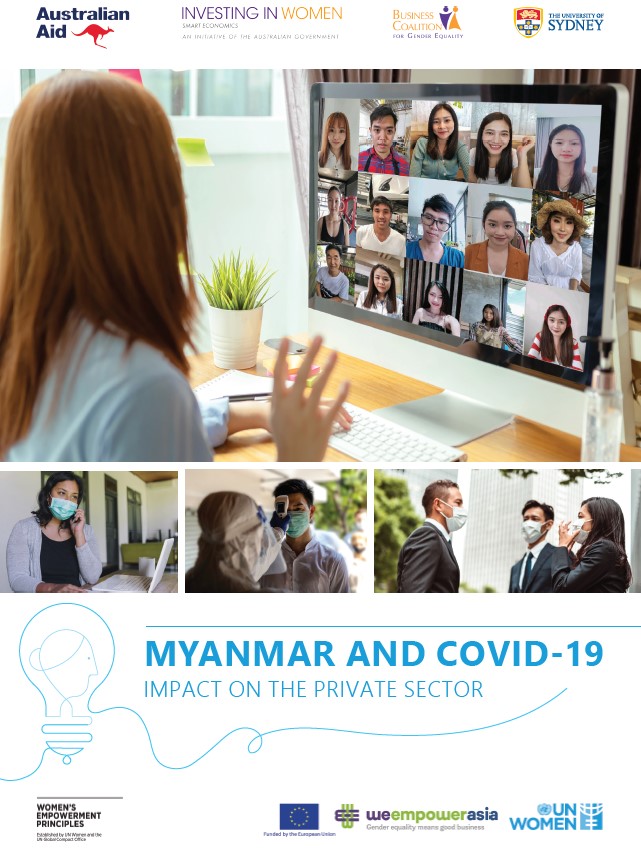
Myanmar and COVID-19 Impact on the private sector

This report focuses on the impact of COVID-19 on private sector employers and not-for-profit organisations in Myanmar, and employees in a single firm. It is based on two surveys:
A small employer survey of twenty-four private sector companies and six not-for-profit organisations. The survey was implemented online between 20th May and 3rd July 2020. The survey was designed to understand the impact of the pandemic on employers and gather information on the challenges faced by private sector employers and not-for-profit organisations, and their commitment to gender equality in the crisis. Organisations were recruited through the Myanmar Business Coalition for Gender Equality (BCGE). The data will support businesses with a particular focus on women employees, in their recovery from economic loss, build resilience against future shocks, and promote women’s leadership and capabilities in preventive measures and preparedness.
A small employee survey from a large financial services business. This survey was administered using an online survey application developed by Investing in Women between 20 July and 2 August 2020. The total number of respondents is 195 (119 female and 76 male).
Key Points
- One in two of the private companies ranked the financial impact and disruption caused by COVID-19 on their business as 8 or more out of 10.
- Two in five private companies were fully operational but teleworking.
- Most companies expect it will take more than 6 months before regular trading resumes.
- Two-thirds of private businesses reported the decline in customer demand was one of the main challenges in the early months of the pandemic.
- Four in five companies allowed employees to telecommute or work from home and provided the required technology.
- Three quarters of the companies included women in their COVID-19 Task Force or Crisis Management Teams.
- One-third of companies believe that social norms mean women and men are impacted differently by the pandemic.
- Half of all companies said the pandemic had created an opportunity to shift to remote working arrangements and new E-commerce and digital markets.
- Improved internet support and digital training for staff is required to support this opportunity.
- Men are more likely than women to experience an increase in income
- One in five workers say they are less productive than before the pandemic.
- Decline in worker productivity is mostly due to anxiety and stress about the pandemic.
- Almost half of all workers had access to PPE and one-quarter had access to flexible work arrangements. Women are more likely to WFH than men.
- Almost half of all workers experienced increased pressure to earn an income.
- More than one third of workers experienced an increase in domestic pressures.
- More than one-third of workers have experienced a decline in their mental health with women more effected than men.
- Almost half of workers experiencing a decline in mental health say it is due to the stress of the situation and more than one-third report financial concerns as the cause.
- Physical health was identified as the greatest challenge of the crisis period by men.
- Women are four times as likely as men to rate mental health as their greatest challenge.
- Similar proportions of men and women identify financial concerns as their greatest challenge.
Learn about the impact of COVID-19 on the private sector in Indonesia, the Philippines and Viet Nam.
For more resources on COVID-19 and Women’s Economic Empowerment, visit: WeEmpowerAsia.